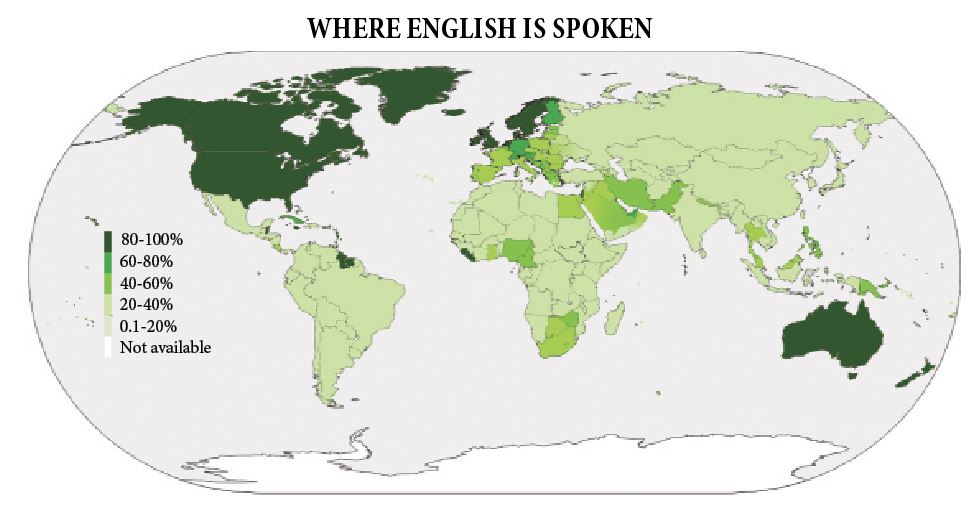“Teacher, Why Must I Learn English?”
Written by Dr. David E. Shaffer
Why must I learn English? – Finding an English teacher in Korea who has not been asked this question by a student would probably be as difficult as finding a needle in a haystack. And finding a parent who has not been asked the same question would likely be just as difficult. I was recently approached with this question by a teacher-administrator who was asked by an elementary school teacher about how to respond to such a question. Of course, a reply of “Because you have to” really doesn’t answer the question, and it surely doesn’t generate in the inquiring student any motivation to learn the language. Here are some good reasons for learning English that will hopefully increase your students’ desire to learn.
Everybody’s Doing It!
Though it may not be a good idea to blindly follow every trend that comes along, the trend toward increased English use has a lengthy and sustained history. More and more, it is becoming the lingua franca worldwide – the language of choice among interlocutors who do not speak the same mother tongue, the language of commerce, the language of academic research, the language of the Internet and of travelers. The world is quickly becoming a global village that is speaking English. Factoid: One-fourth of all the countries of the world have English as an official language and English as the medium of instruction. To make this resonate with students, it may be helpful to point out that their parents know more English and have more need for English than their grandparents did, and that, likewise, today’s students will have more need for English than their parents have.
See the World!
Korea and the world are becoming increasingly transnationally mobile. More people are traveling to more places more often – for business and pleasure, and anything in between. Since the only other country in the world where Korean is widely spoken is a country where South Koreans cannot travel to, knowing a second language becomes a requisite. As shown above, English is the best alternative-language choice for a wide variety of destinations. Again, this can be illustrated to English learners by pointing out that Korean parents today travel internationally much more than their parents did, and today’s students are much more likely to travel internationally as adults than their parents. As an anecdote (that dates me a bit), when I got married, my wife, a Korean, couldn’t even get a regular passport to travel abroad to visit my parents because she was not a Korean diplomat or major businessman. But I digress… The point is that Koreans are traveling more and more and, therefore, will be needing English more and more.

(CC BY-SA 3.0)
English Is the Ticket to a Top-Class Job
This is not a revelation. It is widely known that for the fresh university graduate to land an entry-level job in one of Korea’s top-flight companies, a top-level English test score is required. Even though English may not be a requirement of the job that one is applying for, a high TOEIC score is often needed for a job-hunter to even advance to the interview step of the job hunt. Though an English test score may not be the best indicator of one’s compatibility for a job, it is a fact of Korean life that future job-seekers need to be aware of now, while they still have time to prepare themselves for top-level English exam scores that could land them top-notch jobs. If English learners are not already aware of the importance of English test scores for desirable job opportunities, it is incumbent on the teacher to make them aware.
There are, however, many jobs for which the use of English is required, and the amount of English that one must use in these jobs is ever increasing. One of the reasons for this is that Korea-based firms are increasing their international connections. With the rapid advances in technology, there will be many new occupations created within a decade that we cannot even conceptualize today, and many of these will require advanced English skills. Teachers! Let your students know; make them aware. Discuss it in class. Do a fortunetelling activity.
Learning English Makes You Smarter!
If none of the above reasons seem to satisfy your students or have the motivational effect that you are looking for, tell them that learning English will make them smarter, and that the earlier they start, the greater the effect! Learning a new language means learning a whole new and complex set of rules, vocabulary, and patterns. The brain works through this complexity, giving meaning to words and structures, and boosting cognitive skills such as critical thinking and problem-solving.
The more you use your brain, the better it functions. Working in two or more languages, rather than in just one, requires more variety in recall, which in turn improves memory. Research has shown that knowing more than one language sharpens the mind. In one study, multilingual subjects showed better observational skills and recall of their surroundings. Other studies have shown that multilingual adults have sharper minds for longer. The mean age for the onset of dementia in monolinguals was a full four years sooner than for multilingual adults. According to still other studies, multilingual speakers are better multi-taskers and better decision-makers.
Possibly the most effective way to frame this information about how knowing more than a single language boosts brain power is to frame it for students as “Learning English will improve your grades in other subjects, too!” Since language learning heightens cognitive skills, studies have shown that this translates into higher standardized test scores in subject areas such as math and in reading comprehension.
So, here are some responses to add to your arsenal of answers for the next time you are confronted by a student with the question “Why must I learn English?”
The Author
David E. Shaffer is vice-president of the Gwangju-Jeonnam Chapter of Korea TESOL (KOTESOL). On behalf of the chapter, he invites you to participate in their upcoming March conference and their teacher development workshops at their monthly meetings (always on a Saturday). For many years, Dr. Shaffer has been a professor of English Language at Chosun University. He is a long-time member of KOTESOL and a holder of various KOTESOL positions; at present he is national president. Dr. Shaffer credits KOTESOL for much of his professional development in English language teaching, scholarship, and leadership. He encourages you to get involved. He is board chair at the GIC and also editor-in-chief of the Gwangju News.




I have dedicated myself to improve the quality of English teaching as an individual teacher alll the time and as an administrator whenever I happened to work as one. Still I think that we are promoting Englsih too much over the quality of education. I would like to lower the importance of English in job markets. I believe that the lower importance of English, paradoxically, will increase the proficiency of English since young students may not pay too much attention to the grammar.